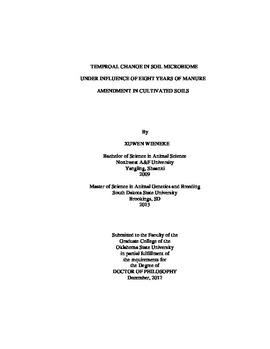| dc.description.abstract | Animal manure is one type of organic amendment that is widely used in sustainable agricultural management. It is established that manure affects soil quality, productivity, and biomass, including soil microbiome. Many studies characterize soil microbiome in responsive to soil amendments (e.g. inorganic- and organic-fertilizer); few studies, however, reveal impact of manure with different phase (e.g. solid vs. liquid) and animal origin (e.g. bovine vs. swine) on soil microbiome. We establish change in soil microbiome that was fertilized with none, solid beef manure (BM), and swine effluent (SE) for eight years. Illumina HiSeq platform was used to survey bacterial community by deep sequencing 16S hypervariable region 4 (V4). Seven soil properties, pH, total nitrogen (TN), total carbon (TC), potassium (K), phosphorus (P), magnesium (Mg), and calcium (Ca), were measured for soil fertility. Mantel test and Pearson correlation coefficient were analyzed to reveal the overall and specific relationship of soil property with microbiome and phylum, respectively. We find that soil microbiome are different under long-term influence of BM and SE fertilization. Results indicate that TC is the key driving factor shaping BM fertilized soil microbiome; whereas K is the main determinant in SE- and non-fertilized soil microbiome. Core microbiome (Actinobacteria, Proteobacteria, Firmicutes, Acidobacteria, Chloroflexi, Gemmatimonadetes, and Planctomycetes) remained stable in non-fertilized soils over time. Phyla Actinobacteria and Firmicutes were enriched in BM; while Gemmatimonadetes and Nitrospirae were responsive to SE. Many of predominant phyla found in our studies (e.g. Actinobacteria, Proteobacteria, Firmicutes, and Chloroflexi) are copiotrophic bacteria, which potentially play important roles in nutrients cycling in soils. We characterize soil microbiome shaped by eight years of manure amendment, identify core microbiome, and determine soil property as the main driving factor in microbiome. Our studies fill the gap of knowledge on impact of long-term soil management on microbiome. | |
